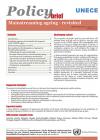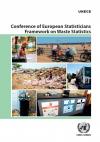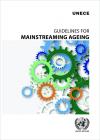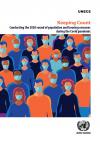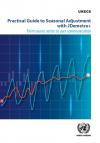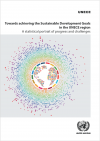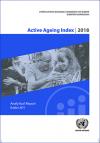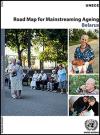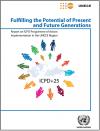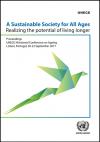Publications
Displaying Results 1 - 20 of 106
- English
UNECE Policy Brief on Ageing No. 28
At any age, intersecting factors such as poverty, disability, social isolation and exposure to abuse can increase the risk of vulnerability and weaken resilience in the case of adverse events. The COVID-19 pandemic, rising inflation, natural disasters, and war are examples of adverse events that have disproportionately affected vulnerable persons, including
- English
The 2022 UNECE Ministerial Conference on Ageing (Rome, Italy, 16-17 June 2022) concluded the fourth cycle of review and appraisal of the Madrid International Plan of Action on Ageing (MIPAA) and its Regional Implementation Strategy (RIS).
These proceedings provide a summary of the Conference deliberations, as well as a synthesis of the policy progress made between 2017 and 2022 to advance active
- English
The Madrid International Plan of Action on Ageing (MIPAA), adopted at the Second World Assembly on Ageing in April 2002, set a comprehensive and bold agenda for ageing-related policies in the 21st century. With the UNECE Regional Implementation Strategy for MIPAA adopted in Berlin the same year, countries drew a roadmap for creating a society for all ages in the region.
This report, issued to
- English
The population of the UNECE region is ageing: one in four people will be 65 years old or above by 2050 compared to one in six today. Population ageing has social and economic implications for which societies need to prepare. This requires a coordinated, whole-of-government and whole-of-society effort to bring societies and economies into harmony with demographic change, otherwise known as ‘
- English
Official waste statistics have been produced for more than 40 years. They were initially developed to monitor and manage threats to human health and the environment. More recently, information needs have shifted toward realizing the economic value of waste, particularly in the context of the “circular economy”. This change has created demand for information on waste types that have not
- English
The most recent in the series of Policy Briefs on Ageing is "Mainstreaming Ageing - Revisited"Unofficial translation (GER)
See all "
- English
Mainstreaming ageing is a policy strategy directed towards integrating ageing issues into all relevant policy fields on all levels, which helps to adapt to population ageing and ensure the integration of the needs of all ages groups, including older persons, into the policymaking process.
The Guidelines for Mainstreaming Ageing outline five stages that support countries in establishing a
- English
When the Covid-19 pandemic broke out in March 2020, preparations for the 2020 round of population and housing censuses were well underway in countries across the UNECE region: some were already in the field, while the majority were in the advanced stages of planning for a 2021 census.
The impacts of the pandemic on census-taking have been wide ranging; from the need for social distancing in
- English
This Guide introduces seasonal adjustment and gives practical guidance to national statistical offices in producing seasonal adjusted monthly or quarterly time series covering all steps in the production process, from the evaluation of the original data series to the dissemination and communication of the seasonally adjusted series. The Guide can be used in introducing new staff to seasonal
- English
The idea of viewing human knowledge and abilities as an asset and to estimate its value is not new but has gained more prominence in recent years. ln 2016, the United Nations Economic Commission for Europe (UNECE) published the "Guide on Measuring Human Capital"with the objective of pursuing the conceptual development of human capital measurement and with a particular focus on
- English
Many countries and regions are facing two increasingly stark trends: rapid urbanization and a growing number of natural disasters caused by climate change-related hazards. Combined, they substantially increase the risk to which many people are exposed.
The increasing number and magnitude of disasters and their impacts on people, the economy and the environment have led to the adoption of global
- English
This report reviews the situation and trends in progress towards the Sustainable Development Goals (SDGs) through the lens of 49 selected indicators under each of the 17 SDGs. Indicators were selected based on their relevance to the UNECE region and availability of data. For the most part, the report relies on the data available in the United Nations Global SDG Database as of 20 December 2019.
- English
The 2018 Active Ageing Index Analytical report jointly launched by UNECE and the European Commission shows that since 2008 most countries in the European Union have improved their overall AAI scores.Progress has been strongest for women. The report presents the latest AAI calculations and progress over time. The Active Ageing Index is a practical tool for policymakers that helps identify
- English
The Road Map for Belarus is the fourth in the Road Map for Mainstreaming Ageing series. It is the result of a close collaboration between UNECE and the Governement of Belarus and a comprehensive participatory process that took place in the country between
- English
Leading, composite and sentiment indicators make it possible for official statistics to shed new light on aspects of the economy and the society, for instance through compilation of leading indicators on the economic development or composite indicators measuring the well-being of households.This publication gives guidance to statistical offices that produce or consider producing leading,
- English
Official statistics are an indispensable element of the information system of democratic societies, serving governments, economies and the public with data that can help them understand and make decisions: about the economy, about the population, about society and the environment. An essential precondition for carrying out this task is a strong legal and institutional setting for
- English
UNECE Countries in Figures presents a profile of social and economic indicators for each of the 56 UNECE member countries.These profiles, prepared by the UNECE Statistical Division, are intended to be of interest to readers not necessarily familiar with statistical terminology or with interpreting statistical tables. A glossary of terms and list of references is available at the back of the
- English
In a world where huge amounts of data are being generated all the time, and where citizens can look up almost anything they want, official statistics must stand out as a unique sourceof impartial and trustworthy information. The Fundamental Principles of Official Statistics – based on professional independence, scientific methods and rigorous quality criteria – give official statistics
- English
Five years after the regional ICPD Beyond 2014 review process and the adoption of the 2013 Chair's summary, UNECE and UNFPA have collaborated to report on the achievements and challenges faced by member States in the implementation of the recommendations contained in that outcome document. This report highlights key population and development trends affecting the UNECE region since the
- English
This publication documents the third cycle review and appraisal of the implementation of the Madrid International Plan of Action and its Regional Implementation Strategy (MIPAA/RIS, 2002) in UNECE member States between 2012 and 2017. The regional review concluded with the 4th UNECE Ministerial Conference on Ageing held in Lisbon, Portugal, on 20-22 September 2017. The Ministerial Conference,



